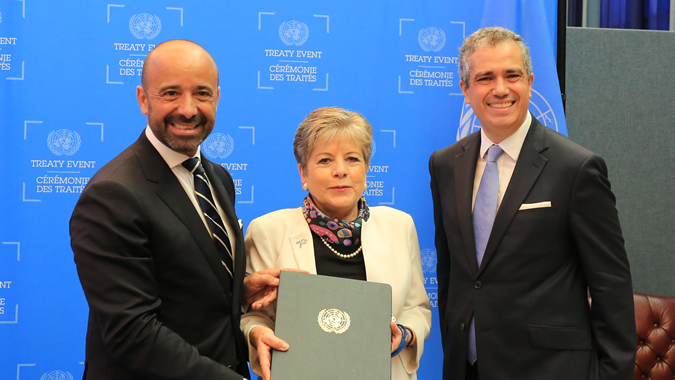Countries Urge for the Prompt Ratification of the Escazú Agreement on Access to Information, Public Participation and Justice in Environmental Matters
Work area(s)
Authorities and experts reiterated its importance for environmental democracy in the region at a workshop held during the Forum of the Countries of Latin America on Sustainable Development 2019.

Authorities from various countries along with representatives of international bodies and civil society organizations called today for prompt ratification of the Escazú Agreement on access to information, public participation and justice in environmental matters, during a high-level workshop held at ECLAC’s headquarters in Santiago, Chile as part of the third meeting of the Forum of the Countries of Latin America and the Caribbean on Sustainable Development.
The Regional Workshop on progress and challenges in relation to implementation of the Escazú Agreement in Latin America and the Caribbean: Toward an Early Entry into Force – organized jointly by ECLAC and the government of Costa Rica – was inaugurated by Alicia Bárcena, Executive Secretary of the Economic Commission for Latin America and the Caribbean (ECLAC); Norman Lizano, Head of Multilateral Affairs at the General Directorate of Foreign Policy of Costa Rica’s Ministry of Foreign Affairs and Worship; Sergio Bergman, Government Secretary of the Environment and Sustainable Development of Argentina; Gale T. C. Rigobert, Minister of Education, Innovation, Gender Relations and Sustainable Development of Saint Lucia; and Andrea Sanhueza, an elected representative of the public in the Escazú Agreement. As a guest of honor, Luis Alfonso de Alba, the United Nations Secretary-General’s Special Envoy for the 2019 Climate Summit, also participated.
In her opening remarks, ECLAC’s Executive Secretary, Alicia Bárcena, indicated that 2019 will be a year of particular relevance for multilateralism, since various international conferences of great importance will be held, including the United Nations High-level Political Forum, the Sustainable Development Goal (SDG) Summit at the level of Heads of State and Government, the Climate Summit, and the Review of the SAMOA Pathway for small island developing States (all of them scheduled for September, in New York).
In this context, she indicated that the Escazú Agreement acquires even greater significance as a catalyst for the 2030 Agenda and climate action. The treaty, which was opened for the signature of all Latin American and Caribbean countries on September 27, 2018 in the framework of the United Nations General Assembly, has already been signed by 16 countries (Antigua and Barbuda, Argentina, Bolivia, Brazil, Costa Rica, the Dominican Republic, Ecuador, Guatemala, Guyana, Haiti, Mexico, Panama, Paraguay, Peru, Saint Lucia and Uruguay) and ratified by one (Guyana, this past April 18th).
“The Escazú Agreement is a citizens’ agreement, made by and for people. It recognizes and develops essential democratic rights and places equality at the center of development, seeking to incorporate all the sectors of our society to tackle environmental challenges of such magnitude as climate change, natural disasters, desertification and the loss of biodiversity,” Bárcena stated.
“In addition, it is the first treaty in the world that protects the human rights of environmental activists. At ECLAC, we feel deeply proud of and committed to this Agreement, and we will continue accompanying the processes for signature and ratification, with the hope of attaining its prompt entry into force and implementation,” the senior United Nations official told the delegations present.
During the workshop, ECLAC’s Executive Secretary also congratulated Guyana on being the first country of the region to ratify the Escazú Agreement, which elicited a round of applauses by the attendees.
Norman Lizano, from Costa Rica’s Foreign Ministry, said his country is firmly committed to the Agreement, its ratification and its prompt entry into force. “The contribution of the Escazú Agreement to multilateralism is manifested in the link it makes between the environment and human rights. The whole world is now watching us, to see how we advance on its ratification,” the ambassador indicated.
Meanwhile, Sergio Bergman advised that Argentina is in the midst of the process to ratify the treaty, which he said he hopes will happen in the short term. “This Agreement guarantees a standard of human rights. It’s not just about linking the environment and sustainable development to human rights, it is also a demonstration of the fact that they go together, they cannot be separated,” he said.
The Minister from Saint Lucia, Gale T. C. Rigobert, also congratulated Guyana on ratifying the Agreement while congratulating all the countries of the Caribbean for always being at the forefront of its signature and ratification process. However, she stressed that it is necessary to ensure the speedy and effective dissemination of its importance among all different publics. “We commit ourselves to continue insisting so that all of our institutions are aware of its provisions,” she indicated.
Meanwhile, in her remarks, Andrea Sanhueza reaffirmed the importance of the Agreement as a “shared achievement of all citizens” and called for establishing a multi-stakeholder dialogue to develop the governance mechanisms that will allow it to be carried out effectively. “The Escazú Agreement is a long-term political commitment and as members of the public, we are going to continue working on behalf of the environment and human rights,” Sanhueza said.
Finally, the UN Secretary-General’s Special Envoy, Luis Alfonso de Alba, called on all the sectors involved to recognize the urgent need to take action – with concrete measures, moving beyond mere statements – to address the challenges posed by climate change. “To undo the current deterioration, actions must be exponentially multiplied, including by more than 200 or 300 percent. We must change the approach and include all actors in the next Summit Climate, and in particular civil society and the private sector. If we do not join forces, we will not be able to reach the proposed goals,” he warned.
Related content

ECLAC Urges All Countries in Latin America and the Caribbean to Sign and Ratify the Escazú Agreement
On the first anniversary of its adoption, the organization’s Executive Secretary, Alicia Bárcena, publishes an open letter highlighting the relevance of this first environmental treaty in the region.
Related event
Type
Country(ies)
Contact
Public Information Unit
- prensa@cepal.org
- (56 2) 2210 2040
